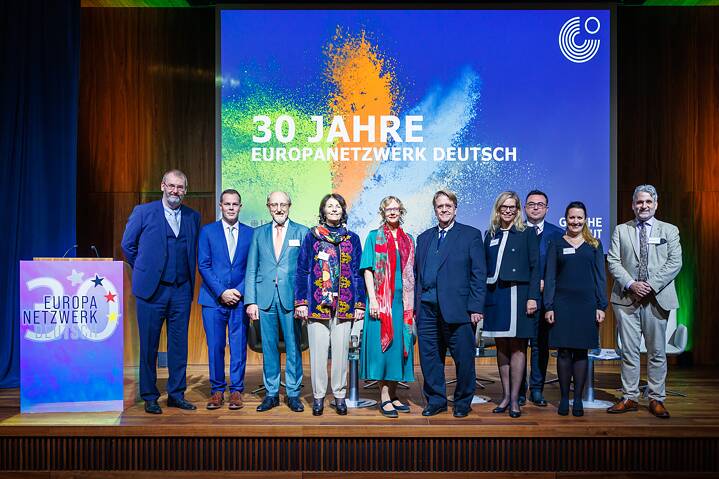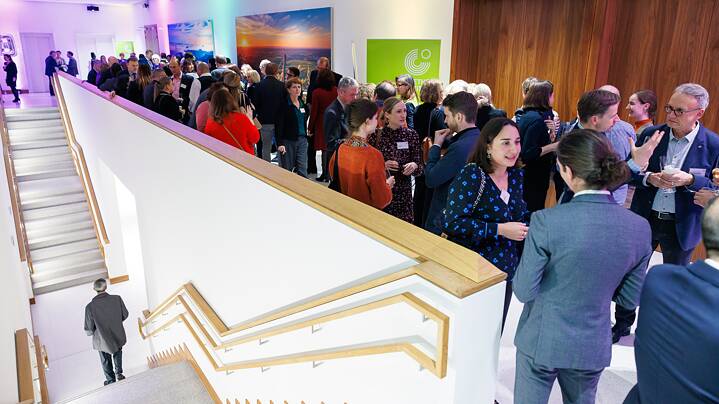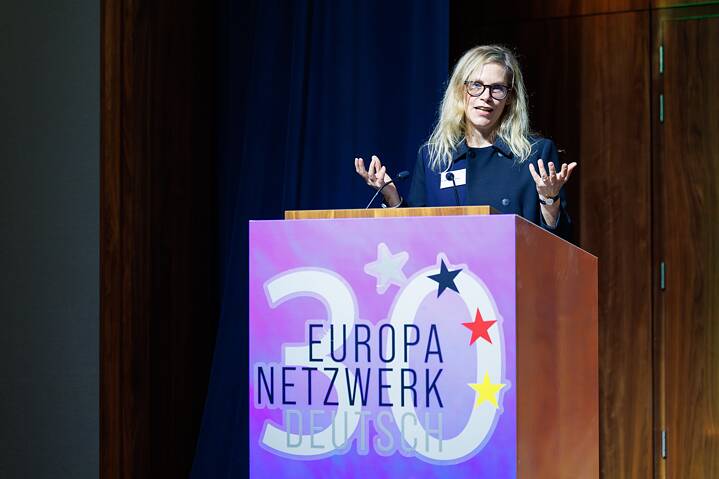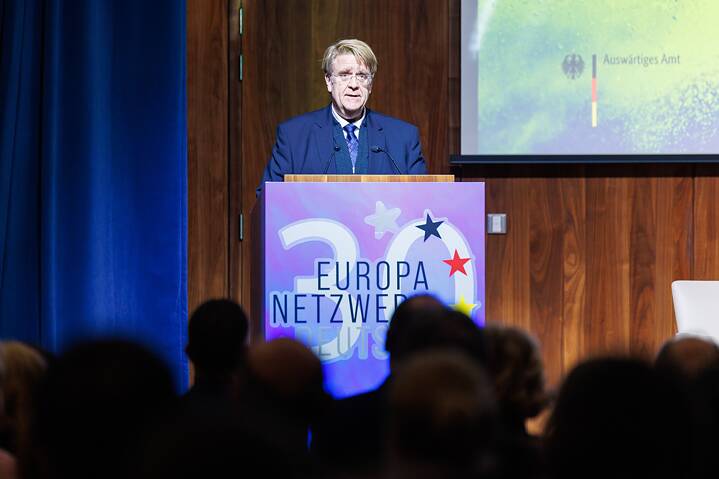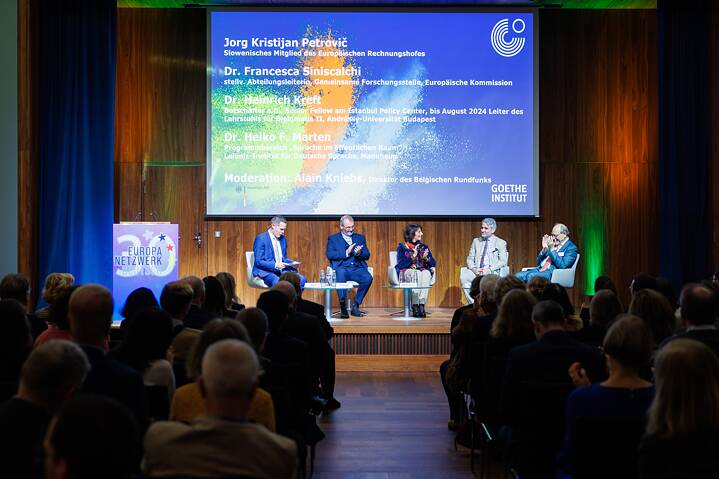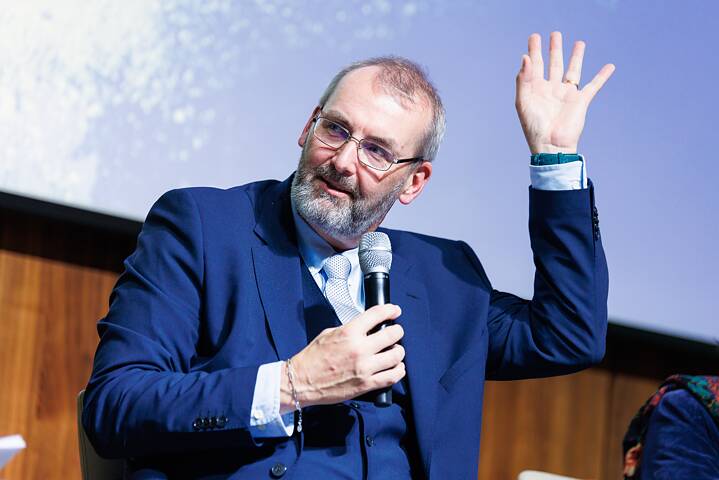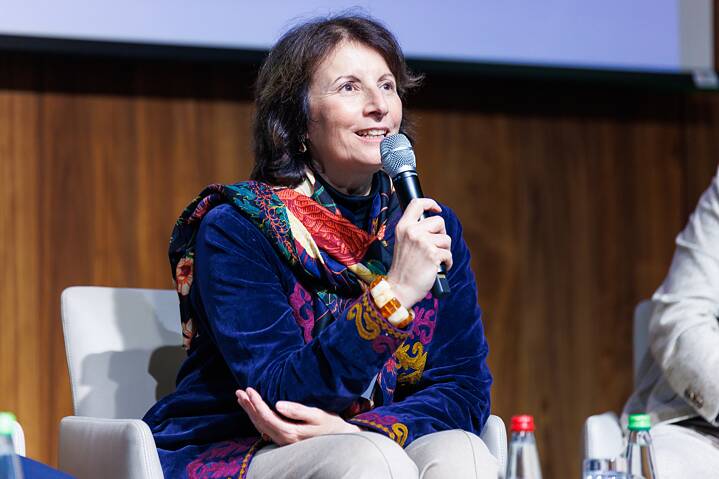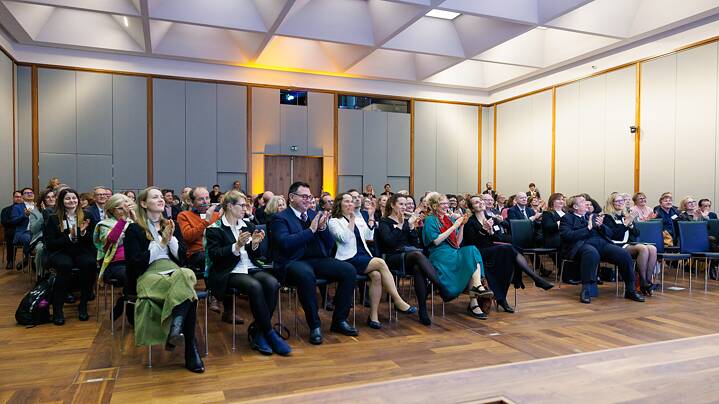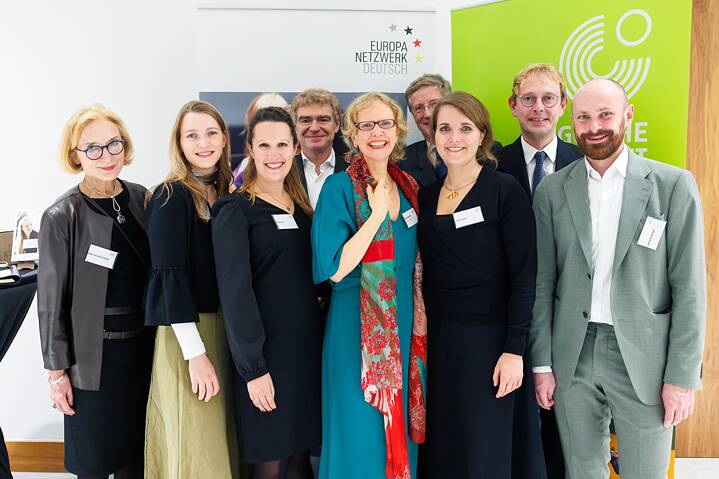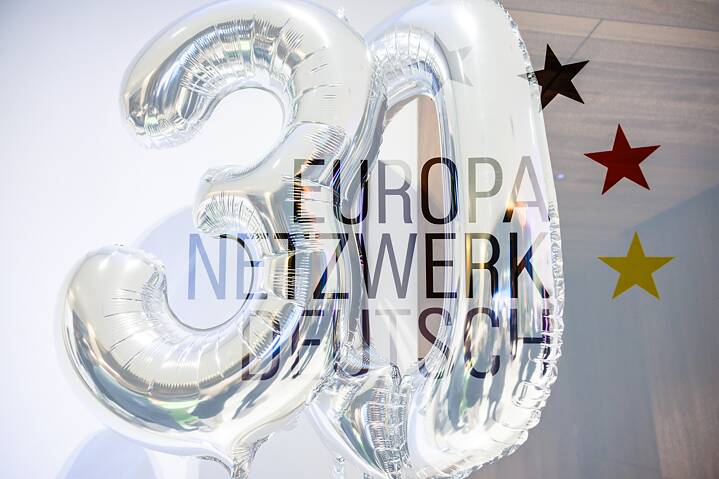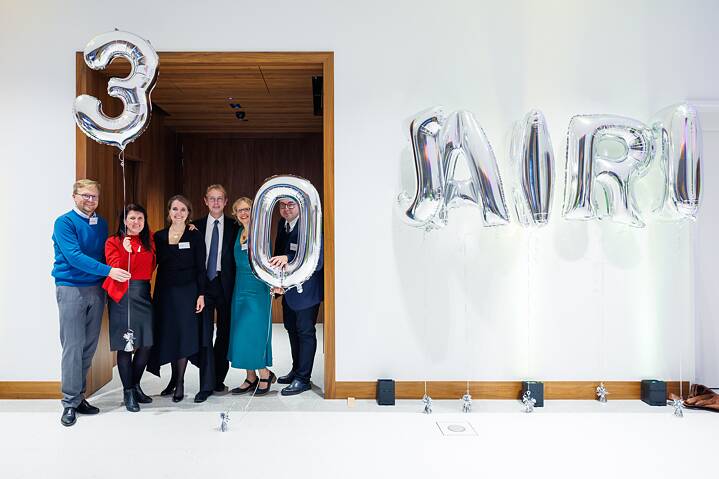Review of the anniversary celebration
30 Years of Europanetzwerk Deutsch
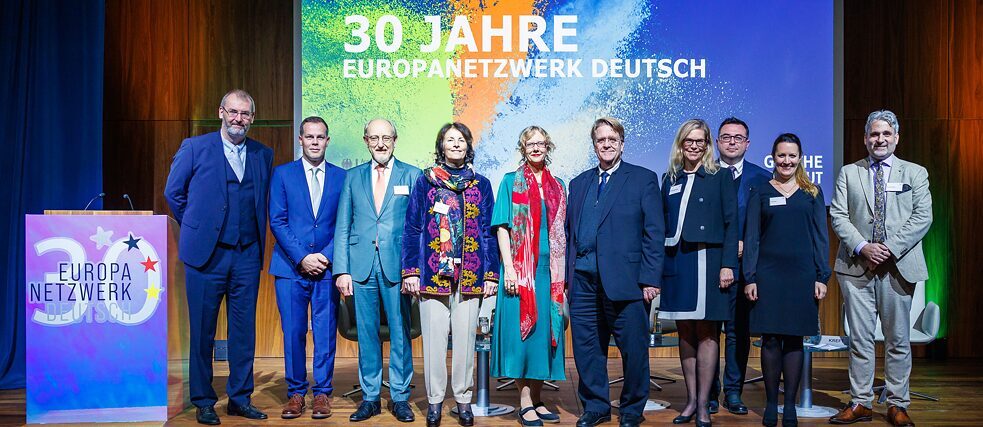
‘Linguistic diversity as an opportunity for Europe’ - this was the motto of the jubilee celebration of the Europanetzwerk Deutsch programme with a high-ranking panel on 14 November at the Representation of the State of Baden-Württemberg to the EU. 2024 the Europanetzwerk Deutsch programme celebrated its 30th anniversary with numerous courses and events focusing on the ‘Future of Europe’, which culminated in the anniversary celebration in Brussels.
The event was opened by Dr Elke Kaschl Mohni, Director and European Representative of the Goethe-Institut Brussels. In her welcoming address, she began by emphasising the Goethe-Institut's European mission in the European capital, which is also a personal concern, indeed a matter close to her heart. As the largest intermediary organisation of German foreign cultural and educational policy in the world, the Goethe-Institut is committed to a united but also diverse Europe. The Goethe-Institut in Brussels promotes new co-operations, strengthens the German language in Belgium and in the EU and opens up perspectives for action throughout Europe in a transnational network. In doing so, it successfully helps to shape an expanded European public sphere and strengthen cohesion in Europe.
Dr Elke Kaschl Mohni also attributed such a commitment to the Europanetzwerk Deutsch scholarship programme, which has hosted over 3,000 scholarship holders from 39 countries in Germany over the past 30 years, who continue to enrich the vibrant European network to this day. In addition to the targeted strengthening of German language skills in a professionally relevant context, the programme participants get to know Germany from a wide variety of perspectives and expand their working contacts at EU level. As the Goethe-Institut, we not only make an important contribution to the promotion of multilingualism in Europe, but also create a place for European exchange, for critical questions and lively discussions about Europe as well as for a change of perspective within the European Union. Her special thanks went not only to the colleagues who are instrumental in implementing the European Network German programme here at the Brussels institute, but also from the Goethe-Institut headquarters in Munich, and above all to all the alumni and alumnae for their continued interest in the German language and the programme.
Ambassador Martin Kotthaus, who has been associated with the Goethe-Institut and especially the European Network German for a long time, recalled the early days of the programme, which was a joint initiative of the then Foreign Minister Dr Klaus Kinkel and Commission President Jacques Delors. At that time, the EU only had 12 member states - many believed it was the ‘end of history’, today we realise what a big mistake that was. Especially in today's world, which is characterised by multiple crises and wars, Europe needs to focus on its strengths: ‘We are the best-connected region in the world, and we need to bundle this relationship,’ said Kotthaus. Understanding each other is fundamental, and language plays a decisive role in this. According to Ambassador Kotthaus, the European German Network has helped to ensure that more German is spoken in the EU institutions, but it is even more important that the programme participants have an understanding of Germany and its concerns in the EU.
Reaching the heart of your counterpart
The importance of language for mutual understanding was also discussed on the panel moderated by Alain Kniebs, Director of the Belgian Broadcasting Corporation. Linguist Dr Heiko F. Marten from the Leibniz Institute for the German Language and former ambassador and diplomacy professor Dr Heinrich Kreft shared the opinion that English is an indispensable lingua franca, but that English - just like communication via artificial intelligence - cannot replace communication in the mother tongue. According to Marten, language is the only way to gain access to culture and reach the heart of your counterpart. It is now important to promote the German language as a ‘complementary language’ alongside one's native language and English. According to Marten, language policy in Germany has room for improvement and the way in which the languages of neighbouring countries, in particular Dutch, Polish and Czech, are learned needs to be reconsidered. According to Kreft, very few people in the diplomatic service have sufficient knowledge of English to be able to negotiate legal texts in a foreign language, for example, which is why interpreters have to be used in this case - not least to give the dialogue partners a little more time to think things over.Immersion in a German world
The importance of language learning - in this case the German language - was underlined by the testimonials of two long-standing alumni of the European Network German, who also emphasised the added value of the programme for them personally. Jorg Kristijan Petrovic (then Vice-President of the Slovenian Court of Audit; now a Slovenian member of the European Court of Auditors), for example, reported on how a one-hour meeting with a German colleague from the Court of Audit in North Rhine-Westphalia - a central component of the intensive German courses organised by the European Network German in Germany (EU courses) - ended up lasting six hours, including a visit to a restaurant together. The result of this meeting: a short time later, the debt brake would also be included in the Slovenian constitution.For Dr Francesca Siniscalchi from the EU Commission, the contacts with other members of the network, which has grown steadily over the last 30 years and is kept alive through regular alumni meetings, various course formats and events, are particularly valuable. She also appreciated the fact that the programme actually immersed her in a German-speaking world, as she spoke exclusively in German with other participants in the programme.
Always just the right word at the ready
The crowning finale was the video performance by spoken word artist Jessy James LaFleur, who, like presenter Alain Kniebs, comes from East Belgium - a region whose almost 80,000 inhabitants - with German as their mother tongue, French and Dutch as their second language - live linguistic diversity as a matter of course on a daily basis. In her contribution, written especially for the anniversary celebrations, the artist, who describes herself as a ‘nomad’ and ‘border crosser’, took the audience on a journey across national and linguistic borders, because ‘words carry us, connect us, even when the distances are huge’, as they are both bridges and home. And so even a language that is sometimes classified as rather unsexy like German ‘always has just the right word at hand’ - a fascination shared by many alumni and alumnae of the Europanetzwerk Deutsch.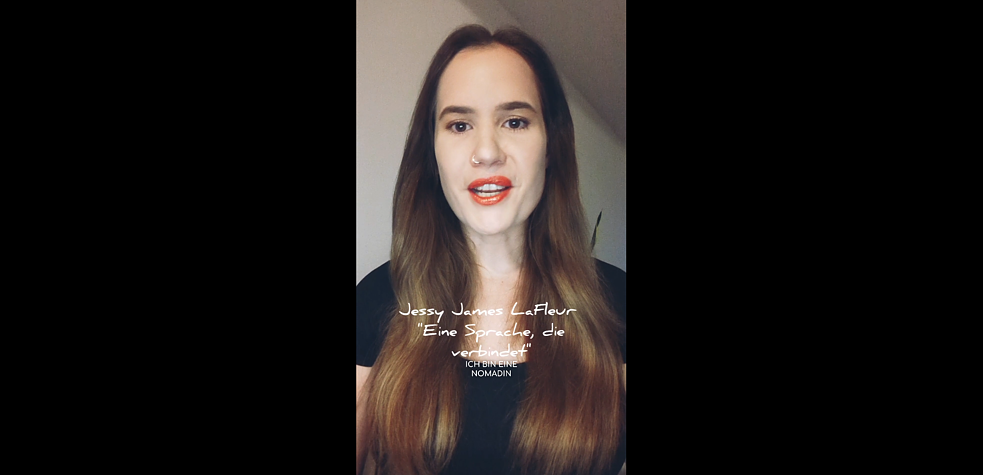
After the substantive programme, the alumni in particular, some of whom had travelled from EU member states especially for this evening, were able to enjoy a reunion with other course participants at a festive reception.
